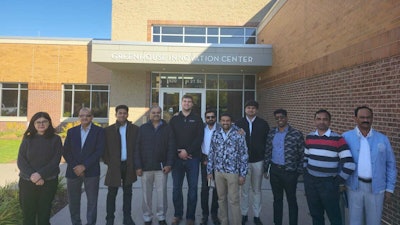
The U.S. Grains Council (USGC) recently hosted a delegation of Indian poultry industry stakeholders on a comprehensive tour of the U.S. agricultural value chain. The visit aimed to demonstrate the safety of biotechnology in U.S. corn and present U.S. sorghum as a non-genetically modified (GM) alternative to address India's current coarse grains deficit.
Led by USGC Regional Director for South Asia Reece Cannady and Marketing Specialist Nayantara Pande, the tour focused on building customer loyalty to U.S. suppliers while offering higher-quality products for Indian end-users.
Key highlights of the tour included:
- A visit to a poultry processing facility in Omaha, showcasing advanced techniques.
- Meetings with University of Nebraska professors and a tour of the Greenhouse Innovation Laboratory to discuss biotechnology safety.
- Visits to multiple corn farms in Nebraska to observe technology integration in farming operations.
- A tour of a rail terminal in Kansas to understand the export process of U.S. commodities.
- Educational sessions at Kansas State University's International Grains Program covering topics such as sorghum grading, storage practices, and poultry diet formulation.
Nayantara Pande noted, "Indian stakeholders are still unsure of precisely what genetic modification technology is. The meetings in Nebraska shed light on not only the safety of GM animal feed, but also the environmental benefits of biotechnology implementation."
The tour also emphasized the potential of U.S. sorghum as an immediate non-GM solution for Indian animal feed manufacturers. Reece Cannady stated, "Following this program, the Indian poultry sector has been diligently pursuing U.S. sorghum exports to India by advocating for common sense phytosanitary measures and the abolition of current tariffs on sorghum imports."
To further promote U.S. sorghum, the USGC plans to conduct multiple feeding trials in India in the coming year, aiming to demonstrate that U.S. sorghum is tannin-free and suitable as a primary coarse grain in poultry diets.
This initiative underscores the USGC's commitment to addressing global food security challenges while promoting U.S. agricultural products in key international markets.

















